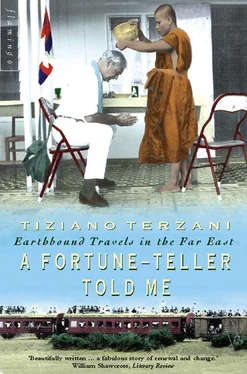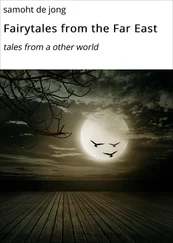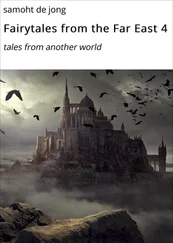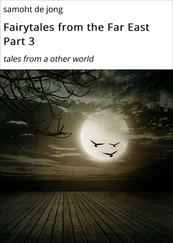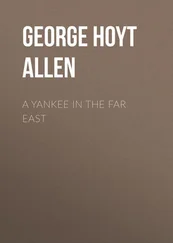This was one of the famous caves where people lived during the war. Here, in the stone bowels of the mountain, the bombs of the B-52S could not penetrate. But in 1968 a T-28, a small plane used by the pro-American government forces, sighted the cave and scored a direct hit with a phosphorus rocket. The explosion within the stone walls was tremendous. Over four hundred people died. There were no survivors.
About thirty yards from the entrance the cave dipped, and only by the light of my pocket torch could I penetrate any further. Soon I realized I was walking on bones – some of them small, presumably children’s. In the absolute silence I imagined that I could hear, muffled as if by a veil, the cries of the dead. I thought of the participants’ different perspectives at that fatal moment: the pilot, tense and excited, aware of having scored a bull’s eye; the havoc below, the cries of the wounded as they crawl to the depths of the cave, never to come out of it again.
Of course it was because I felt so moved that I ‘sensed’ all this. But does not such a tragedy, or any other great sorrow, leave some sort of residue in the air and in the soil? What did the ancients mean by the spiritus loci, if not that something remains hovering in a place where something exceptional has happened?
On the way down the mountain we passed a group of children cutting wheels for one of their imaginary cars from the stump of a banana tree. ‘Have you been in that cave?’ I asked them. One and all, they drew back from me, as if in terror. ‘No!’ they cried. ‘You can’t go there! It’s scary, the phii are in there!’ The spirits, ghosts.
In the West, this would be called something like ‘the Cave of the Martyrs’, and annual ceremonies would be held in their memory. Their story would be taught in schools. For the Laotians history does not bear this kind of meaning. In that hole are not the remains of their relatives, but only ghosts that have saturated the walls with wailing, suffering, horror. From this they must simply keep away.
In their vision of the world the relation between cause and effect is not the same as in ours. Shortly before my visit, near the Plain of Jars, a group of American experts had spent some weeks looking for MIAs (Missing in Action), pilots of planes shot down during the war whose deaths had never been verified. They dug in the jungle, sifting the earth to retrieve the least splinter of bone, and spent their evenings in Phongsovane. The Laotians did not show the least hostility towards them. Nobody even tried to show them one of the many children who even today are born deformed because of the chemicals released there by the Americans a quarter of a century ago.
The wife of the photographer of Phonsovane held one of these in her arms – a three-year-old child with a large square head and stubby hands with the fingers all stuck together. ‘Karma,’ she said, Buddhistically attributing the horror of that child to some sin committed in his previous life.
To go from Xianhuang to Pakse’ in southern Laos I had to take another plane: the usual bouncing Chinese-made Y-21 with a pilot, a co-pilot, seventeen seats and a baggage compartment where the only toilet was. When I boarded the plane it was crammed full of mysterious floppy blue plastic sacks: they were in the aisle, on the empty seats, stacked to the ceiling in the baggage-toilet, piled against the emergency exit. I tried to lift one: very heavy. They were full of meat – pork and beef. In Vientiane meat costs twice as much as in the Plain of Jars, and thus it was that the pilots supplemented their meagre socialist wages. I remembered how, a few weeks earlier, in an airfield in the north, a Russian Antonov, just back from an engine overhaul, had been unable to take off and had caught fire. All the passengers had saved themselves by climbing out in time.
I wondered how anyone could get out of this plane, as every escape route was blocked by those heaps of flaccid bundles. I disliked the thought that if disaster struck, my flesh would be mixed with the meat in the sacks and nobody would be able to tell who had been who. But then I thought with relief of the Americans. I had heard that in the labs in Hawaii where they send what they find in their search for the MIAs, the Americans can determine whether a bone fragment belonged to one of their soldiers or not.
The sky grew dense and grey, and we threaded through heavy rainclouds and flashes of lightning among the steep, dark green mountains. The landscape had an extraordinary primitive beauty, but I could not enjoy it. Between one bounce and another I vowed that if this plane ever landed in Savannaket, where it was due for a stop-over, I would get off and continue my journey by boat. And so I did.
The Mekong was flat and undramatic, its opaque surface broken now and then by great bubbles of mud. We glided slowly between the two banks that summed up the contradiction I would have liked to resolve: on the left the Laotian shore with villages shaded by coconut palms, dinghies moored below rough bamboo ladders, oil lamps gleaming softly in the silence of evening; on the right, the Thai shore with neon lights, canned music and the distant rumble of motors. On one side the past, from which everyone wants to tear the Laotians away, on the other the future towards which all and sundry believe they must rush headlong. On which shore lies happiness?
On 31 December I was in the forest of Bolovens, on a high plateau three thousand feet above sea level, with the Mekong to the west, the Annamite range to the east, and the Khmer plain to the south. This was the most heavily bombed region in the history of the world, because it was the assembly point for all the supplies coming from Hanoi along the Ho Chi Minh Trail before they were redirected, either towards Cambodia in the direction of Saigon or towards central Vietnam. Not one building has remained standing from the colonial period, not one pagoda, not one village. Everything was demolished in the relentless earthquake of American bombs. Nature itself has been obliterated: the forest has become a scrubland, and even today you seldom hear a bird’s call. Only here and there on the fertile red earth have some Japanese and Thai companies begun to revive the famous coffee plantations.
I stayed in a wooden hut built over a waterfall. The roar of the water was deafening, and I spent New Year’s Eve pleasantly awake, imagining the strange 1993 that had reached its birth-hour. An omelette of red ants’ eggs seemed perfectly suited to marking the occasion. By the time the hands of my watch casually swung past midnight, the decision not to fly had turned into an obvious one. With that slow, ancient descent by boat along the Mekong my days had already acquired a new rhythm. And yet I felt as if I were doing something bold, almost illicit. After a lifetime of sensible decisions, I now allowed myself a choice based on the most irrational of considerations. The limitation I was imposing on myself made no sense at all.
On the morning of 1 January 1993, to give my decision a symbolic flourish, I took my first steps of the new year on the back of an elephant. The route to Pakse’ crossed a valley which long ago had been the crater of a volcano. The grass was tall and very green, punctuated here and there by brilliant silvery plumes of the lulan that barely stirred in the wind.
The elephant basket was shaky and uncomfortable, but its height gave me a perfect opportunity to enjoy the world from a different perspective.
Конец ознакомительного фрагмента.
Текст предоставлен ООО «ЛитРес».
Прочитайте эту книгу целиком, купив полную легальную версию на ЛитРес.
Читать дальше
